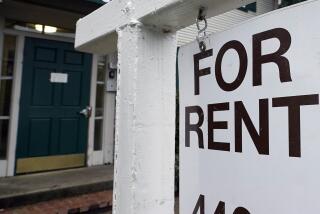Exchange Avoids Tax When ‘Trading Up’
If you could find a perfectly legal way to pyramid your real estate investments without paying taxes, would you be interested?
Here’s a simple method--the tax-deferred exchange--that is available to everyone who will take a few minutes to learn.
The Internal Revenue Code, Section 1031, provides the tax break you need. All you must do is start with a small investment property, perhaps a single-family rental house, fix it up to increase its value and pyramid your equity by making a tax-deferred exchange for a larger investment property, such as an apartment building.
But you don’t need to make a direct trade of one investment property for another.
Because of the changes in IRC 1031(a)(3), you can now sell your first property, have the cash proceeds held beyond your control by a third party, such as your bank or attorney, and then use the money to buy a larger investment property, all without paying tax on your sale profit.
This special “delayed trade” is called a Starker exchange.
Does this sound too good to be true? Every year thousands of knowledgeable taxpayers use tax-deferred exchanges to profitably dispose of one investment or business property and acquire a more desirable property.
What is a tax-deferred exchange? The theory of IRC 1031 is that real estate investors who dispose of one property and acquire another have one continuous investment and, therefore, should not be taxed on the transaction.
For example, my first tax-deferred exchange was the trade of my equity in a triplex for a nine-unit apartment building. I avoided tax on my profit by trading up. But the apartment-building seller, called a “down trader,” owed tax on his profit when he immediately sold my triplex.
In other words, trades up are tax-deferred, but trades down are taxable. But the “up-trader” cannot take out any “unlike kind” property from the exchange, such as cash or net mortgage relief.
The benefits of exchanging. Exchange benefits, other than tax avoidance, include estate building, increased local property tax revenues and encouragement of property improvements.
Although the primary reason for exchanges is to avoid tax erosion and to have maximum equity available to acquire a larger property, additional reasons include an increase in the owner’s depreciable basis, minimizing need for new mortgage financing, trading out of a property that is difficult to sell, acquiring a property that better meets the owner’s goals and building a large estate without paying tax along the way.
How to qualify for a tax-deferred exchange. All properties in a tax-deferred exchange must be held for investment or for use in a trade or business. Examples include apartments, offices, warehouses, stores and vacant land. Your personal residence and “dealer property,” such as a home builder’s inventory of new homes, cannot qualify. Real estate limited partnership shares are specifically excluded.
The three rules of tax-deferred exchanging. To qualify for a tax-deferred exchange, three basic rules must be satisfied:
--All properties must be “like kind.” That means virtually any real estate except your home or dealer property can qualify. To make your personal residence eligible for a tax-deferred exchange, you can convert it to investment or business property by moving out, renting it to tenants and then exchanging it. IRC 1031 does not specify any minimum rental time before making the swap.
--”Unlike kind” property received by the trader is taxable. Unlike kind property is personal property, such as cash or net mortgage relief, or a personal residence or dealer property. Stocks and bonds cannot qualify, since they are personal property and are not real estate held for investment or for use in a trade or business.
However, like kind real estate does not mean “same kind.” To illustrate, you can make a tax-deferred exchange of apartments for a warehouse, a parking lot for an office building or vacant land for a shopping center. But you cannot make a tax-deferred exchange of your apartment building for a personal residence because both properties are not like kind.
--To qualify for tax deferral you must trade up to a more expensive property and not receive any unlike kind property, called “boot,” such as cash or net mortgage relief.
Starker delayed exchanges make trading easier. The primary drawback of tax-deferred exchanges is that the property you want to trade probably isn’t what the owner of the property you desire seeks. But IRC 1031(a)(3), enacted in 1984, says you can sell your like kind property, have the sale proceeds held by a third-party intermediary beyond the trader’s constructive receipt, designate within 45 days after the sale closes the property to be acquired, and complete the acquisition within six months.
These delayed trades are called Starker exchanges because T. J. Starker was the first person to complete such a delayed trade and have it approved by the courts.
A real estate or tax attorney should be used to document a Starker delayed exchange and to make certain the sales proceeds do not come into the constructive receipt of the up-trader. Leaving sale proceeds in an escrow account clearly won’t qualify. Further details on tax-deferred exchanges are available from your tax adviser.
Following are some commonly asked questions about exchanges.
Starker Exchanges Not for Sale of Your Home
QUESTION: When I talked to a local broker about trading my home for a larger house, she didn’t have the slightest idea what I was talking about. Please clarify how I can trade my house for another without paying tax on my profit.
ANSWER: There is no need to make a tax-deferred exchange of your home for another home, assuming both are your personal residences. Exchanges apply only to business and investment properties, such as apartments, land, warehouses and commercial buildings.
Personal residences are eligible for the much better “roll-over residence replacement rule.” To defer the profit tax on the sale of your personal residence all you must do is buy a replacement principal residence of equal or greater cost within 24 months before or after the sale.
No Tax Due Unless It’s a Property Sale
Q: About two years ago we made a tax-deferred IRC 1031 exchange of land for a single-family house that we rented to tenants. Recently the tenants notified us they plan to vacate. We are considering moving into the house as our residence. Will we then have to pay tax on our profit from the land sale?
A: No. A tax is not due unless there is a property sale. Your conversion of the house from rental to personal residence status is not a taxable event. However, when you sell that house, without buying a qualifying replacement, then your profit tax will become due. Please ask your tax adviser to explain further.
Further details are in Bruss’ special report “Current Tax-Deferred Exchange Developments and Starker Delayed Exchanges,” available for $3.50 from NewspaperBooks, Box 4386, Orlando, Fla. 32802.
More to Read
Inside the business of entertainment
The Wide Shot brings you news, analysis and insights on everything from streaming wars to production — and what it all means for the future.
You may occasionally receive promotional content from the Los Angeles Times.










